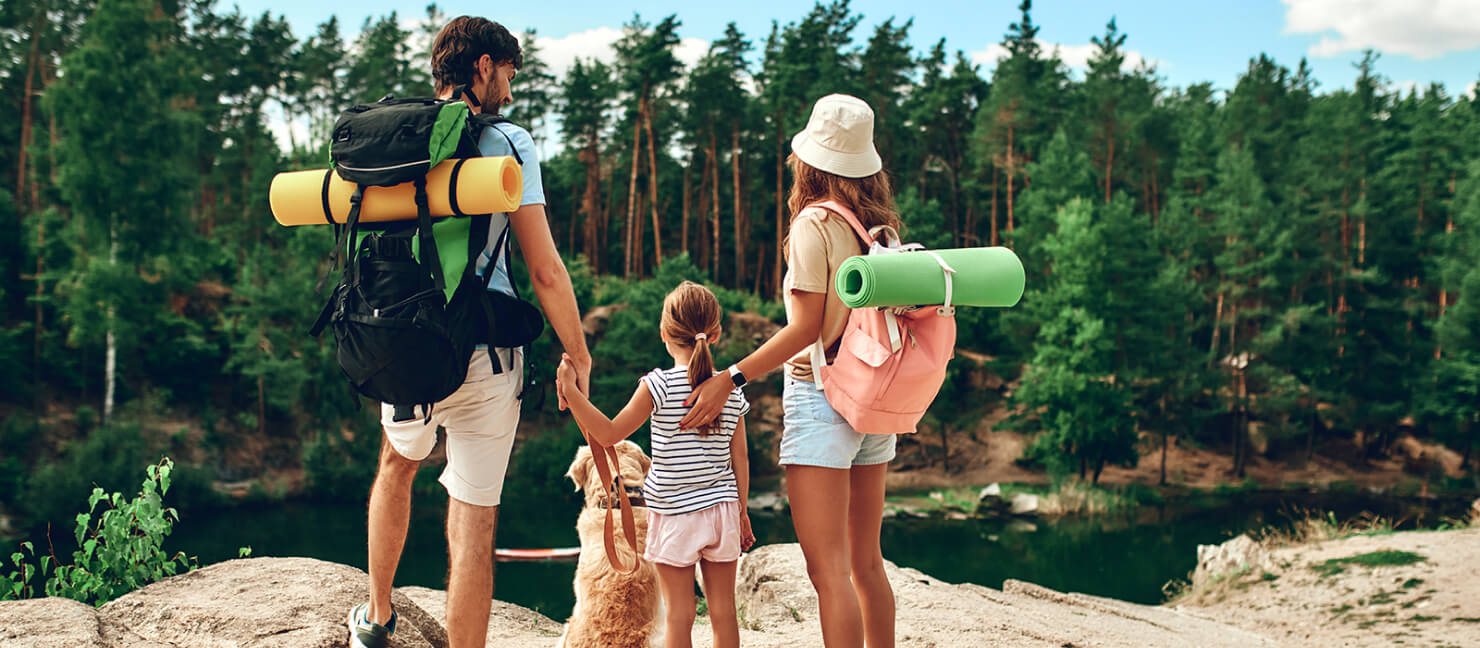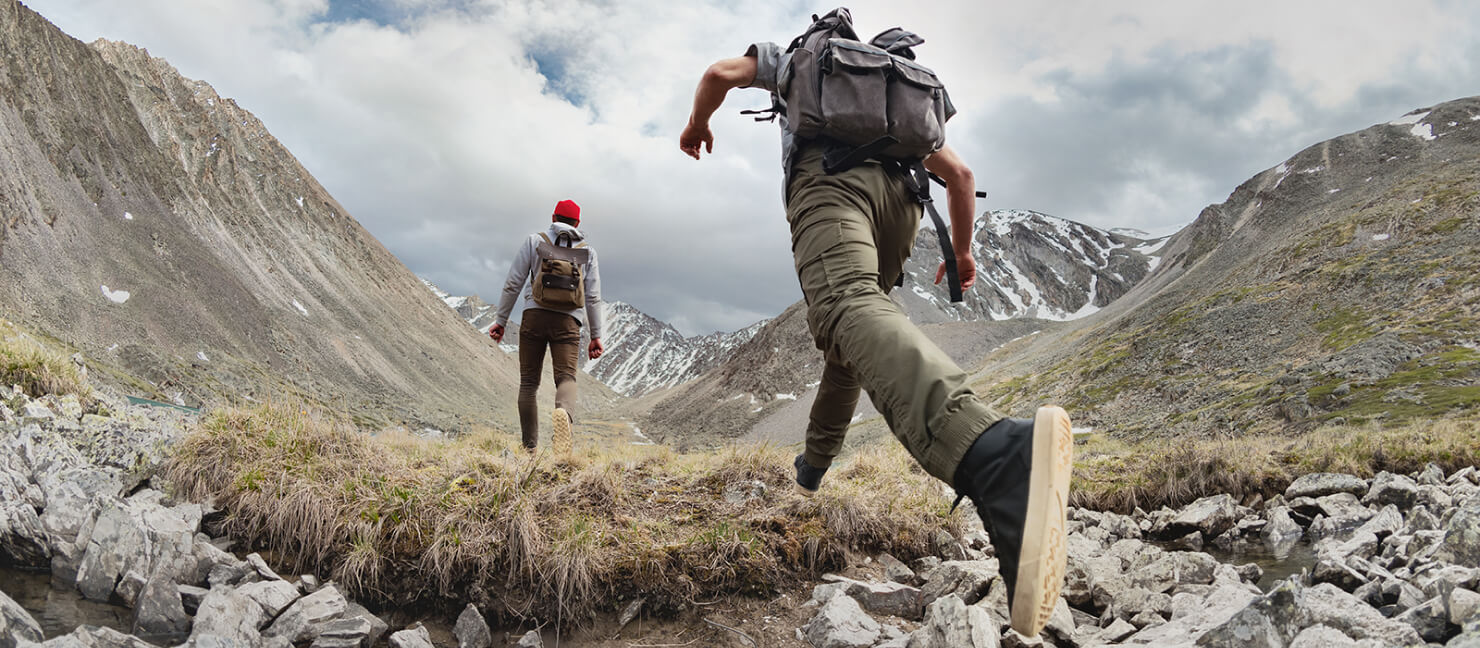
Hiking vs Backpacking: Learn the Differences & More

Have you tried hiking and wondered about taking it to the next level with backpacking? While both offer great workouts and stunning scenery, backpacking offers a more immersive experience. In this guide, we'll explore the key differences between hiking and backpacking, the gear required for each, and the unique adventures they offer.
Key Takeaways
- Backpacking vs Hiking: Key Differences: Hiking is shorter in duration and calls for basics like water bottles and hiking attire. Backpacking involves longer trips and overnight gear.
- How to Train for Hiking and Backpacking: Prepare your body for hiking and backpacking by taking regular walks, strengthening your core, and focusing on lower body exercises.
- Adventures Compared: Defining Key Terms: Mountaineering requires specialized gear and involves scaling mountains. In contrast, trekking is like an intensified version of a hike.
Backpacking vs Hiking: Key Differences
Many outdoor enthusiasts often use the terms hiking and backpacking interchangeably, but they are distinct adventures. While hiking is a vigorous day activity that takes place on marked paths, backpacking is a multi-day journey that can push you to your limits and immerse you deep in nature. Backpacking challenges you to step out of your comfort zone by carrying everything you need on your back. Discover the core differences between these two outdoor pursuits — from the equipment required to the physical demands and trip durations.
| Backpacking vs Hiking Explained | ||
|---|---|---|
| Category | Backpacking | Hiking |
| Gear | Outdoor backpack, sleeping supplies, cooking gear, trekking poles, water purification, and navigation tools | Daypack, basic hiking gear, snacks/water, and map/compass |
| Typical Distance | Typically 3-10 miles a day | Typically ½ mile to 10 miles a day |
| Trip Duration | Multi-day/overnight | A few hours to a full day |
| Physical Demand | High endurance, mental resilience | Moderate endurance, basic fitness |
| Ideal Experience |
Beginner Backpackers: 1-2 night excursion with a local group and trained guide Advanced Backpackers: Extended, off-the-grid experience |
Beginner Hikers: Short hike at a leisurely pace on a well-maintained trail Advanced Hikers: 5-10 mile hike on a challenging trail |
| Skills Required | Navigation, camp set-up, and cooking skills | Basic trail reading |
| Permits Needed | Usually required (especially for multi-day treks) | Daypass is sometimes required but there are many free trails |
| Typical Location | Remote locations, backcountry/wilderness areas | Accessible trails, parks, and forests |
Backpacking Explained
Backpacking is a unique outdoor experience that combines hiking with overnight stays in the wilderness. Unlike a day hike, backpacking trips span several nights — requiring backpackers to carry essentials like tents, food, and cooking gear. The experience demands physical stamina, mental resilience, and a deep connection with nature. As backpackers traverse remote areas, they not only cover daily hiking distances but also set up camp. You'll require permits and sufficient supplies to sustain you for several days.
Backpacking: What You Should Know
-
Gear: Your backpacking checklist should encompass essentials like a specialized backpack, tent, trekking poles, first aid kit, cookware, hydration pack, as well as sunscreen and bug spray.
-
Typical Distance: On a backpacking trip, plan to cover anywhere from 3-10 miles of hiking each day. Be prepared for rocky and hilly terrain.
-
Trip Duration: Shorter trips can last anywhere from 1-2 nights while longer trips tend to average 5-7 nights. Pack enough food and gear to last the whole journey.
-
Physical Demand: You should be in peak physical condition to conquer a backpacking trip. Don’t backpack if you have a cold or the flu.
-
Ideal Experience: A quintessential backpacking journey involves starting in the backcountry, enjoying a moderate hike, and then setting up camp.
-
Skills Required: For longer backpacking adventures, prior experience with shorter trips is essential. Skills in cooking, navigation, fire-building, and tent setup are helpful.
-
Permits Needed: You may need to secure permits and make reservations before your trip. Do plenty of research in advance to obtain the right permits.
-
Typical Location: You can backpack mountain ranges or remote backcountry. Expect challenges like river crossings and high-altitude hikes.
Backpacking Pros
-
Rewarding: Experience a sense of achievement from tackling challenging hikes and living off the grid. You’ll learn to survive without modern conveniences.
-
Isolation: Embrace solitude, immerse yourself in nature, and enjoy moments of reflection away from civilization. Backpacking gives you plenty of time to think and make major decisions.
Backpacking Cons
-
Unpredictability: Unexpected challenges can arise. You might encounter extreme weather, wild animal encounters, and broken gear.
-
Logistics: There is a lot of time and preparation needed for backpacking vs hiking. This includes mapping routes, securing permits, and determining daily mileage.

Hiking Explained
Hiking is a versatile outdoor activity that caters to a range of fitness levels and interests. Typically requiring minimal gear, hikers set out with essentials like appropriate clothing, sunscreen, snacks, and a water bottle.Trails can range from short, hour-long walks to full-day treks. Trails are typically well-maintained and color-coded. You may need to pay a small entrance fee for some national parks, but most trails are free.
Hiking: What You Should Know
-
Gear: Bring a water bottle, trekking poles, first aid kit on your hike. Wear a hat and sunscreen to protect against the elements.
-
Typical Distance: Hikes can be a short ½ mile loop or an extended 10-mile hike. Bring enough supplies for the journey there and back.
-
Trip Duration: You can plan a 30-minute hike or hike for a full 8 hours. Budget 20-30 minutes for each mile you plan on hiking.
-
Physical Demand: Beginners can enjoy flat, easier hikes so long as they are in moderate shape. For more challenging hikes — you’ll need to be in peak physical condition.
-
Ideal Experience: Start your hike during daylight hours. Bring water and snacks for longer hikes. Enjoy mountain views and solo or group hikes.
-
Skills Required: Most trails are color-coded, which makes navigating simple. Basic compass and map reading skills should suffice.
-
Permits Needed: Gather any permits you’ll need before you set out on the trail.
-
Typical Location: You can drive to local trails, forests, or state parks. You might encounter slippery terrain, rocks, and wild animals.
Hiking Pros
-
Beginner-Friendly: Hiking welcomes a range of fitness levels — allowing for frequent breaks, choice of simpler trails, and a slower pace.
-
Limited Gear: You don’t need a ton of gear to get started. Simply grab essentials like a water bottle and good shoes for a quick hike.
Hiking Cons
-
Unruly Hikers: Encountering hikers who litter, play loud music or lack trail manners can disrupt the serene wilderness experience.
-
Time Constraints: Without the option of overnight stays like in backpacking, hikers must complete their journey before sunset to avoid violating park regulations.

Expert Tip:
For budget-friendly backpacking in the U.S., consider staying on land managed by the Bureau of Land Management (BLM). With oversight of 245 million acres of public land, the BLM provides free access and a variety of recreation programs, including hunting and fishing, for visitors.
How to Train for Hiking and Backpacking
Embarking on a hiking or backpacking adventure requires both physical and mental preparation. Proper training ensures you're equipped to handle the challenges of the trail and fully enjoy the experience.
-
Walk Frequently: If you're a beginner, try and walk 10,000 steps each day. This builds stamina and gets you accustomed to prolonged walking.
-
Hill Runs + Circuits: Running up hills or engaging in circuit training can boost your cardiovascular health. This will also build leg muscle.
-
Break in Footwear: Before attempting longer treks, wear your hiking boots or shoes on shorter day hikes. Always have a moleskin on hand to address any blisters that might form.
-
Strengthen Your Core: A strong core enhances balance and stability — crucial for navigating uneven terrains. Start with sit-ups, planks, and other basic core exercises.
-
Lower Body Workouts: Incorporate exercises like lunges, squats, and calf raises into your routine. These can be done with or without weights to strengthen leg muscles.
-
Stretch + Rest: After rigorous training — always stretch your legs to maintain flexibility. Ensuring adequate rest gives your muscles time to recover.
Expert Tip:
To get ready for your backpacking journey, you'll be shouldering an additional 30-40lb. of equipment. Start by packing your backpack with all the necessary gear. Then, embark on regular hikes to condition your body for the added weight.

Adventures Compared: Defining Key Terms
It's common for terms like mountaineering and trekking to be used interchangeably with backpacking and hiking. Learn the differences between each term below.
Backpacking vs Mountaineering
Mountaineering elevates the challenges of outdoor adventure — demanding both specialized training and equipment to navigate mountainous terrains. Unlike backpacking, it's a high-stakes endeavor that often takes you into extreme conditions.
-
Requires technical training, ensuring climbers are prepared for the ascent. A knowledgeable guide is often needed for safety and navigation.
-
Utilizes specialized gear — from ropes to harnesses. Helmets help protect against potential falls.
-
Presents a level of risk and physical challenge that goes beyond typical backpacking. The stakes are higher — demanding utmost caution and preparation.
-
Environments can be harsh, with many mountaineering routes exposing climbers to sub-freezing temperatures. Proper attire and equipment are vital to combat these conditions.
Hiking vs Trekking
Trekking refers to extended, challenging journeys often in remote areas. Unlike hiking — it demands more preparation and can lead adventurers into isolated terrains.
-
Often requires a guide, especially when navigating unfamiliar or particularly challenging terrains. Treks can last days to weeks.
-
Equipment needs can be more extensive, with some treks necessitating items like oxygen tanks, especially at high altitudes. Trekking requires more gear compared to hiking.
Have Fun Out There!
Ready to set off on your hike? To get the most out of your hiking experience, you’ll need to prepare with the right hiking gear. At Academy, we carry everything you need for two-hour day hikes or 12-hour hiking adventures. Shop our selection of trekking poles, hiking clothes, and much more!


